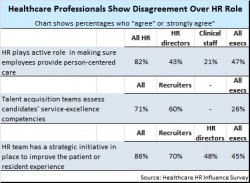 Human resource professionals who work in healthcare say what they do makes a difference in the quality of care employees provide.
Human resource professionals who work in healthcare say what they do makes a difference in the quality of care employees provide.
In an online survey completed by 516 healthcare industry professionals, 82% of those working in HR, “agreed” or “strongly agreed” that they play “an active role in making sure employees provide person-centered care.”
However, when medical professionals responded to that same question, only one in five felt that way. Though the number of clinical and non-HR staff taking the survey was fewer than 60 respondents, the small percentage who see a role for human resources in patient care suggests a disconnect if not disagreement.
“These survey results probably highlight the different ways that clinical and non-clinical staff views person-centered care,” says Kathy Poteate, interim HR Director at Hugh Chatham Memorial Hospital.
“Many directors of nursing and RNs believe that person-centered care is delivered solely through clinical services. While those are certainly important, hiring and developing the right people is also a key component in delivering person-centered care.”
There’s also a significant disconnect in the role recruiters see themselves playing and how healthcare executives across the HR and medical groups see it.
Where 60 percent of recruiters agree or strongly agree they “assess candidates’ service-excellence competencies (such as compassion and adaptability) during the hiring process,” only 26 percent of the executives say this. The number of directors, managers, VPs, and executive officers participating in the survey were large enough — more than 200 — to be significant. So when just over a quarter of them believe their talent acquisition teams are considering a job candidate’s people skills, it’s a reason for concern.
Says Rebecca McNeil, senior education manager at HealthcareSource, a survey sponsor, “Recruiters are shouldering a lot of responsibility when it comes to performing this type of assessment; yet they’re not publicizing their efforts when it comes to improving the patient or resident experience. It’s important to track the impact and results of new hires so that when turnover goes down and customer satisfaction scores go up, you can draw a correlation between the benefits of assessments in the recruitment process and organizational success.”